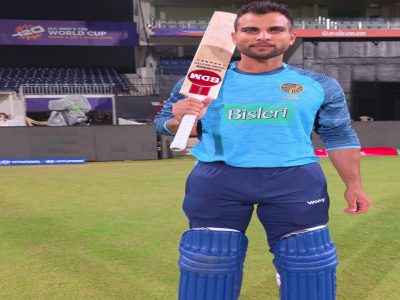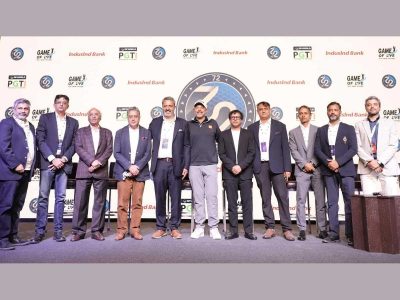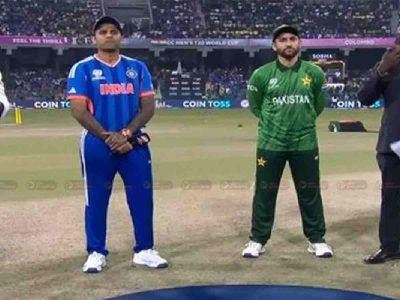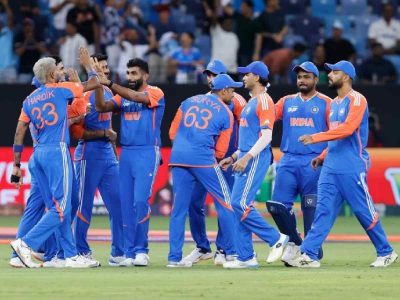If things go according to plan, in all likelihood journalist Rajat Sharma will be the new BCCI chief, a position he can hold for more than five years
Rajat Sharma has become an interesting news story himself. Arguably the most influential broadcaster in the country with a direct hotline to the prime minister, Sharma is the owner and editor-in-chief of the top Hindi news channel—India TV— which has sponsored Sector 137 Metro Station in Noida, where the channel’s office is located. A 60-feet portrait of Sharma hangs on the outer wall of the station, chin up and his hands folded across his chest: an image of a man in control.
He became a household name when he started hosting the longest-running talk show in India, Aap ki Adalat, which has stuck to its format and popularity for over a quarter of a century.
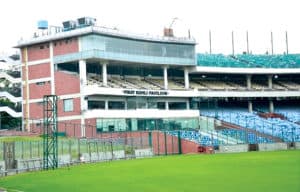
Sharma has never been ambivalent about his support to the BJP and has many friends in the party in power. But it’s the famous friendship with late Arun Jaitley, former finance minister and an accomplished lawyer, for 45 years that Sharma himself acknowledges has had a profound impact on his life. Even Prime Minister Narendra Modi, while attending an India TV event recently, couldn’t resist the temptation of asking Sharma the secret of his friendship with Jaitley. Sharma describes Jaitley as “my best friend who, being elder to me, was also my guardian.”
Arun Jaitley dominated Indian cricket administration like very few in the past two decades, running the Delhi & District Cricket Association (DDCA) for a long time. His management was lately marred with controversies, allegations of corruption and nepotism. In July 2018, Sharma was elected the president of DDCA and soon became the undisputed leader and a successor to Jaitley, not only in the DDCA but depending how things pan out in the next few weeks at the national level, may become the next president of the Board of Control for Cricket in India (BCCI).
Sharma is quick and decisive in his actions. His key advisors call him ‘a doer’. Within a month of Jaitley’s demise, a gala event was held at the Jawaharlal Nehru Stadium on September 12 where Delhi’s cricket stadium at Feroz Shah Kotla Grounds was renamed as Arun Jaitley Stadium. Home Minister Amit Shah was present for three hours — the entire duration of the ceremony. Also, a pavilion stand was named after Virat Kohli.
Though the event was well-received, all were not happy. The East Delhi BJP MP, Gautam Gambhir, was conspicuous by his absence. He wanted a pavilion to be named in his name as well, like Bishan Singh Bedi, Mohinder Amarnath and now Kohli. There’s a gate in the stadium named after Virender Sehwag. “It required the stature of Rajat Sharma to ignore Gambhir’s tantrums who has become very demanding. Sharma is a no-nonsense person,” says a senior functionary at DDCA.
Siddharth Sahib Singh, son of former Delhi chief minister Sahib Singh Verma and brother of Parvesh Verma, the BJP MP from West Delhi, who along with Salil Seth in 2017 was made by Justice (Retd) Vikramjit Sen the signing authorities for all financial and banking transactions for DDCA after an internal fact-finding report pointed to alleged financial misappropriation, didn’t deny Gambhir’s haughty attitude. “We are friends and played together for the same club and in the Ranji Trophy. I will just say ‘No comments’,” he said.
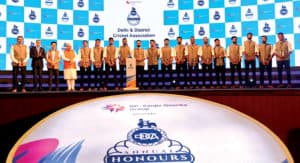
He, along with Salil Seth, who’s an advisor without salary, keep Rajat Shama abreast about day-to-day happenings in the DDCA. With Sharma’s larger-than-life stature and trusted friends in the government who believe in his ability to deliver the goods, he could possibly be the face of Indian cricket in years to come.
The election for the post of the BCCI chief is to take place on October 22 when the Annual General Meeting (AGM) is scheduled. It will be held under the supervision of Vinod Rai, who heads the Supreme Court-appointed Committee of Administrators since January 2017.
Sharma taking the reins of the DDCA has ruffled many feathers and disturbed a hornet’s nest. Many of those entrenched in the system, the beneficiaries and the status quo, are trying their best to curtail his growing influence. One of them is DDCA secretary Vinod Tihara, who has written to the Electoral Officer of BCCI, N Gopalaswami, that Sharma has been illegally nominated by the Apex Council as DDCA’s representative to the BCCI without the mandatory approval of AGM.
There are certain other elements, insiders inform, including Rajiv Shukla and CK Khanna, who have sent a long list of objections to Rai as to why Sharma should be allowed to contest for the top job. The DDCA’s CEO Ravi Kant Chopra, a retired bureaucrat, was in Mumbai on Wednesday to sort things out on behalf of Sharma. Vinod Rai has given his consent for Sharma to contest but many of his detractors are making last-ditch efforts to prevent him from contesting.
It’s no coincidence that Sharma’s candidature comes at a time when Amit Shah’s tenure as a cricket administrator, that of nine years, is coming to an end. Despite that, Shah remains the most influential player and his support in the great measure will determine the next president of the BCCI. That makes Sharma a strong contender, insiders in BCCI claim. If Sharma gets elected, which has a high probability, he will have a long tenure at the helm. He will get two three-year terms, minus the period he served at the head of DDCA, which is just over a year. A change of guard is on the cards, with Bengal’s Sourav Ganguly, a former Indian cricket captain, also a contender for the top post.
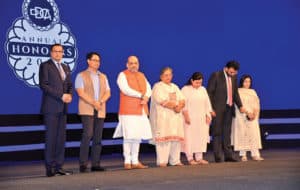
Sharma is a doer
Rajat Sharma is a doer and doesn’t want hiccups when a task is to be performed. Though he inherited the mantle from Jaitley, his style of functioning is very different. He draws experience from running his news channel like a corporate entity. Even his fervent critics say he’s not corrupt, a rich man who’s not in DDCA to make money.
Insiders compare his style to that of Jaitley’s, who like a true politician pampered both the warring groups so as to retain his personal influence. He allocated something to all in terms of contracts for hosting an event, civil works or to handle logistics — so that all have the delusion of support from him. Sharma, in that sense, is far more professional.
“Jaitley ensured that there was something for everyone, and in the process, he would command influence. Nothing would get done without his consent or intervention. He was accessible,” says Sameer Bahadur, secretary of the NCT (National Capital Territory) Cricket Association. In contrast, “Sharma has an impregnable fortress around him. Advisors feed information to him from the outside world and there’s no feedback,” he adds.
Bahadur, with former Test players like Bishan Singh Bedi, Surender Khanna and Kirti Azad — a former BJP MP — were the most ardent and informed critics during Jaitley’s tenure. They were the whistleblowers and campaigners against what they described as “rampant corruption in DDCA”. They continue to perform the same role as they feel different leadership has not cleaned the muck in the system.
Bishan Singh Bedi has written to the CEO of DDCA pointing to various alleged malpractices like conflict of Interest of various functionaries, inducting outsiders as coaches and selectors, no action against charge-sheeted cricketers, and non-domicile players from making a backdoor entry into various age-group teams. “I have met Sharma many times, he is polite and a good listener,” says Bahadur, “But nothing gets done.”
Detractors say access is an issue and Sharma meets somebody only when an appointment is sought as he’s a very busy man. He hardly ever visits the DDCA office and has installed a bureaucracy to run the show — which Bahadur refers to as an “impregnable wall.” Last year in August, soon after Sharma became the president, DDCA appointed Chief Executive Officer, Chief Financial Officer and Chief Operations Officer. Ravi Kant Chopra, PC Vaish and GR Saxena respectively hold these positions. Chopra retired as the Director General, Defence Estates and is a member of Delhi Bar Council.
“Most of them are retired bureaucrats with fat salaries,” says Bahadur. They are outsiders and don’t understand the sport – this is the general objection by some members of the DDCA. DDCA secretary Vinod Tihara is a vehement critique of this arrangement and wants to play a greater role in decision making. “Tihara got elected with Rajat Sharmaji, is now against him. He’s corrupt and forced selectors to sign on blank documents after calling them to his place in Rohini,” alleges Siddharth Singh.
Sharma’s advisors and functionaries at DDCA who don’t want to be named, apart from fairly erudite Siddharth Singh, says that Sharma has infused professionalism instead of ad hoc decision making. Earlier, there were no laid norms followed in ticketing, tendering or a host of other activities by DDCA. Now there’s a designated team of professionals that follow laid down norms, implement Lodha Committee reforms for the BCCI in true spirit.
An insider informs, the new thrust areas are cricket academies where children from poor backgrounds will be able to play without having to pay a penny, with training by experts and coaches. DDA has already allocated two of the playing grounds in Pitampura and near Akshardham Temple. All the players will be medically insured and their daily allowance has been doubled. The gymnasium at Arun Jaitley Stadium is being revamped to ensure world-class facilities.
While the administration is in the hands of professionals, they have no role to play in the selection of players. The selection of players and honing of talent will be done by senior Test players of yesteryears. The newly formed Cricket Committee of DDCA had members like Sehwag, Akash Chopra and Gambhir. This year Yashpal Sharma and Sunil Wason were appointed in the Cricket Committee. The ‘Yo-Yo’ test to evaluate aerobic endurance of players has been made mandatory in DDCA and fitness tests are regularly carried out.
“Rajat Sharma has no role to play in the selection of players. The Cricket Committee does it. And he never interferes in their work. Therefore people who meet Rajat Sharma to get someone of their choice selected are disappointed and accuse him of ‘doing nothing’,” explains a close aide of Sharma who wants to be anonymous.
While Sharma never shies away from expressing his gratitude towards Jaitley, he is not very happy with the state of affairs he has inherited and is committed to change it. Infusing professionalism is the first step. He’s not happy with Arun Jaitley Stadium which has been built over the years in a piecemeal manner. For instance, there’s a pillar in the middle of the stand that blocks the view. He’s not averse to a new stadium befitting the status of the capital of India.
Rajat Sharma is open to bringing about changes that will have a profound impact on the way cricket is administered in the country, and will outgrow his mentor. All eyes are on BCCI AGM later this month.


